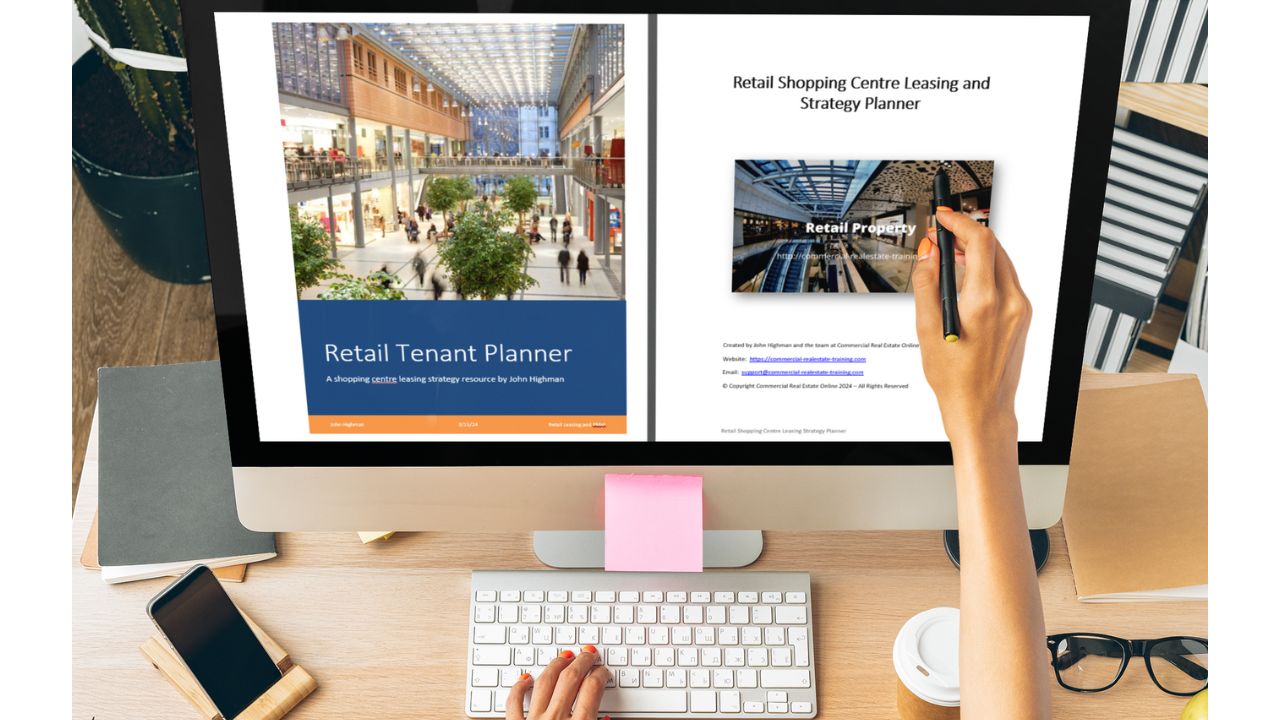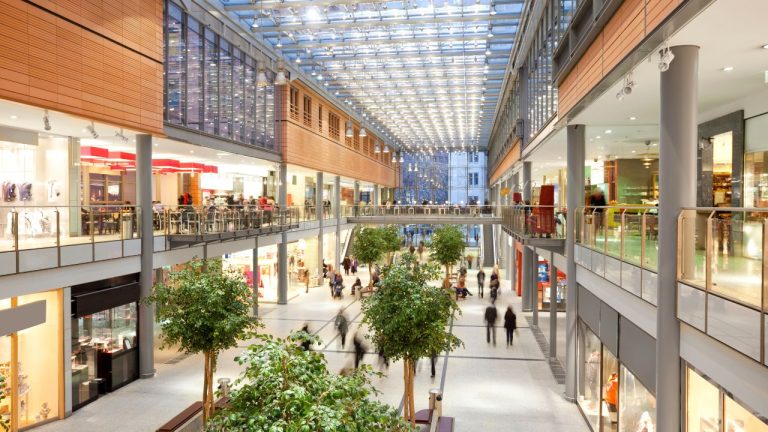10 Strategies for Shopping Centre Managers to Attract Tenants and Fill Shop Vacancies
Are you a shopping centre manager or leasing executive looking to fill those empty shop spaces and attract new tenants? This article is your guide to revitalising your shopping centre and bringing in new business.
We’re here to share ten strategies for a vibrant and bustling retail environment. From creative marketing tactics to strategic partnerships, these tips can make your shopping centre the place to be for shoppers and retailers alike. Let’s embark on this journey of growth and success together!

Download retail property checklist here
Checklist for real estate agents in sales, leasing, or property management.
Get the fully detailed retail property and shopping centre checklist in PDF form for your ongoing reference and use in sales, leasing, or property management activity with investment properties.
Introduction to the Tenant search
Welcome to the ultimate guide for shopping centre managers like you, who play a crucial role in boosting leasing strategies and filling those pesky shop vacancies! As a shopping centre manager, your efforts in attracting tenants are vital for maintaining a vibrant and bustling retail environment.
In this article, we will explore ten effective strategies that, with your implementation, can help attract tenants, increase foot traffic, and ultimately drive leasing success. Let’s dive in and make a difference!
1: Understanding the current market and target audience
Understanding the current market and target audience is crucial for shopping centre managers looking to attract tenants and fill shop vacancies. By analysing market trends, demographics, and consumer preferences, managers can tailor their leasing strategies to meet the needs of potential tenants.
It’s also essential to conduct thorough research on competitors in the area. Understanding what other shopping centres offer can help identify market gaps your centre can capitalise on. This knowledge can also differentiate your shopping centre and highlight its unique selling points.
Understanding your target audience’s shopping behaviours and preferences is a key factor in attracting tenants. By aligning your tenant offerings with consumer demand, whether it’s trendy boutiques, family-friendly stores, or niche retailers, you can create a tenant mix that appeals to their interests. This is crucial for attracting foot traffic and ensuring the success of your shopping centre.
In today’s competitive leasing landscape, staying ahead of market trends and understanding your target audience will give your shopping centre a strategic advantage in attracting tenants seeking prime retail space. Rest assured, these strategies have been proven effective and can guide you towards success.

2: Identifying the unique selling points of the shopping centre
Identifying your mall’s unique selling points is crucial when attracting tenants. Step back and evaluate what sets your mall apart from the rest. Is it a convenient location with high foot traffic? The modern design and amenities that provide a pleasant shopping experience? Or perhaps the diverse mix of retailers caters to a wide range of customers?
Highlighting these unique features in your leasing packages can make your shopping centre more appealing to potential tenants. Emphasise how their business can benefit from being part of such a vibrant and attractive environment. By showcasing what makes your mall unique, you create a compelling reason for businesses to choose your space over others.
Every shopping centre has something unique to offer, be it stunning architecture, strong community connections, or innovative marketing strategies. Identifying and leveraging these unique selling points is a powerful way to attract tenants and stand out in the competitive leasing market. Remember, showcasing what makes your mall unique creates a compelling reason for businesses to choose your space over others.
3: Creating attractive leasing packages for potential tenants
When it comes to attracting potential tenants, shopping centre managers must create attractive leasing packages. These packages should be competitive in terms of pricing and offer added value to entice businesses to choose your space. Consider including perks like flexible lease terms, marketing support, or even assistance with storefront renovations.
Another way to make your leasing packages stand out is by highlighting your shopping centre’s unique features and benefits. Whether it’s a prime location with high foot traffic, ample parking spaces, or access to popular anchor stores, showcasing what sets your property apart can be a strong selling point for potential tenants.
Additionally, being open to negotiation and customising leasing agreements based on the needs of individual businesses can help seal the deal. Flexibility shows you are willing to work collaboratively with tenants to ensure a mutually beneficial partnership.
Overall, shopping centre managers can successfully fill shop vacancies and cultivate a thriving business community within their premises by creating attractive leasing packages that align with potential tenants’ needs and preferences.

4: Utilising social media and online platforms to promote vacancies
In today’s digital age, social media and online platforms have become powerful tools for shopping centre managers to promote vacancies. Managers can reach a wider audience of potential tenants by utilising platforms like Facebook, Instagram, and LinkedIn.
Creating visually appealing posts showcasing available spaces with detailed descriptions can capture the attention of interested parties scrolling through their feeds. Using targeted ads on these platforms allows managers to target individuals within their desired demographic or industry.
Engagement is key. Responding promptly to inquiries and comments shows professionalism and builds trust with potential tenants. Sharing testimonials from current tenants can also provide credibility and encourage others to consider leasing at the shopping centre.
Utilising online listing websites such as LoopNet or Commercial Real Estate can also expand visibility to a broader range of prospects actively searching for commercial properties. Effectively leveraging these platforms can significantly increase the chances of attracting quality tenants to fill shop vacancies.
5: Networking with local businesses and community organisations
Networking with local businesses and community organisations is a crucial strategy for shopping centre managers looking to attract tenants and fill shop vacancies. Building strong relationships with nearby companies can create opportunities for collaboration and referrals.
Attending local networking events or joining business associations can help you connect with potential tenants interested in leasing space at your shopping centre. Building these partnerships can also lead to joint promotions or events that drive foot traffic and increase visibility for both parties.
Engaging with community organisations allows you to tap into established networks within the area. By participating in community initiatives or sponsoring local events, you support the neighbourhood and position your shopping centre as an integral part of the community.
Collaborating with like-minded businesses and organisations can open up new possibilities for tenant recruitment and create a vibrant environment that attracts shoppers. Networking is all about fostering mutually beneficial relationships that ultimately contribute to the success of your shopping centre.

6: Hosting events and promotions to increase foot traffic
Looking to boost foot traffic and attract more tenants to your shopping centre? Hosting events and promotions could be the key!
Organising fun events like live music performances, food festivals, or seasonal markets can create a buzz around your property. These gatherings not only draw in crowds but also showcase the vibrant atmosphere of your shopping centre.
Consider collaborating with local businesses for joint promotions or hosting themed weekends to engage visitors. Encourage tenants to participate by offering them opportunities to showcase their products or services during these events.
Promote these activities through social media platforms and local listings to reach a wider audience. Engaging content like sneak peeks, behind-the-scenes glimpses, and interactive polls can generate excitement leading up to the event day.
By hosting memorable experiences at your shopping centre, you’ll increase foot traffic and enhance the overall appeal of your property as a lively destination for shoppers and tenants alike.
7: Collaborating with real estate agents and leasing companies
Collaborating with real estate agents and leasing companies can be a game-changer for shopping centre managers looking to fill shop vacancies. These professionals have the expertise and connections to bring in potential tenants that align with the shopping centre’s vision and target market. By forming strategic partnerships, shopping centre managers can tap into a more comprehensive network of businesses seeking space for their operations.
Real estate agents understand the local market trends and can provide valuable insights on pricing strategies and lease terms. Their knowledge can help attract high-quality tenants committed to long-term leases, ensuring stability for the shopping centre. On the other hand, leasing companies specialise in matching tenants with suitable properties based on their specific needs and preferences.
Working with these industry experts streamlines the leasing process and opens up new opportunities for growth and expansion. Through collaboration, shopping centre managers can access a pool of pre-qualified leads and negotiate favourable deals that benefit both parties. It’s all about building solid relationships within the real estate community to drive success in filling shop vacancies effectively.

8: Offering incentives or discounts for long-term leases
Are you looking to attract tenants for your shopping centre? Offering incentives or discounts for long-term leases can be a game-changer in the competitive leasing market. By providing attractive deals, you entice potential tenants and encourage them to commit to a longer lease agreement.
Incentives such as rent discounts, free fit-out periods, or promotional support can persuade businesses to choose your shopping centre over others. These incentives show that you are invested in their success and willing to work with them on a mutually beneficial arrangement.
Long-term leases provide stability for both parties involved. Businesses benefit from locking in favourable terms while you secure consistent rental income and reduce the hassle of frequent turnover. It’s a win-win situation that fosters strong partnerships and promotes business growth within your shopping centre.
Consider tailoring your lease incentive packages based on the needs and preferences of different types of businesses. Personalizing offers shows that you value each tenant and are willing to accommodate their specific requirements.
By offering enticing incentives for long-term leases, you set yourself apart as a proactive, flexible landlord committed to fostering lasting relationships with tenants.
9: Maintaining good relationships with current tenants to encourage referrals
Maintaining strong relationships with current tenants is crucial for shopping centre managers aiming to attract new ones. By fostering a positive rapport, managers can encourage satisfied tenants to refer their connections and colleagues to lease space in the shopping centre.
Regular communication with existing tenants helps managers understand their needs and concerns, allowing them to address any issues promptly. This proactive approach not only enhances tenant satisfaction but also showcases the shopping centre as a landlord who cares about its occupants.
Organising tenant appreciation events or offering exclusive perks can further solidify these relationships. Recognising and rewarding loyal tenants can incentivise them to promote the shopping centre within their networks, leading to potential referrals and increased leasing opportunities.
By prioritising tenant satisfaction and engagement, shopping centre managers can create a supportive community within the premises while attracting new businesses through word-of-mouth recommendations from existing tenants.

10: Tenant Search Conclusion
In conclusion, attracting tenants and filling shop vacancies in a shopping centre requires a strategic approach.
All those strategies combine market understanding, unique selling points identification, creative leasing packages, effective promotion through social media and online platforms, strong networking efforts with local businesses and community organisations, engaging events and promotions to drive foot traffic, collaboration with real estate agents, offering incentives for long-term leases, maintaining good relationships with current tenants for referrals.
By consistently implementing these shop leasing strategies and adapting to the changing market dynamics, shopping centre managers can maximise occupancy rates and create vibrant retail environments that benefit tenants and shoppers alike.





